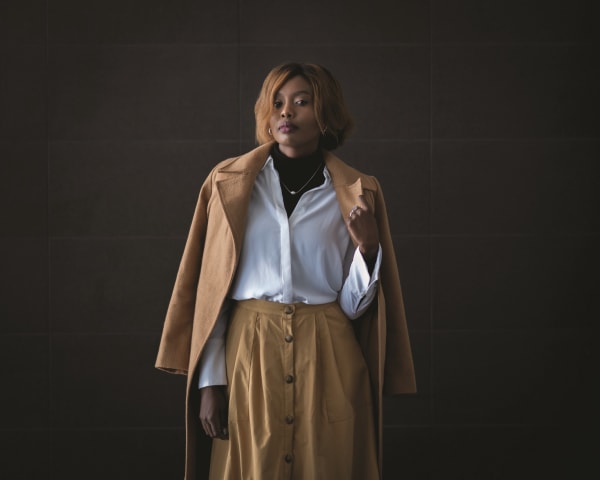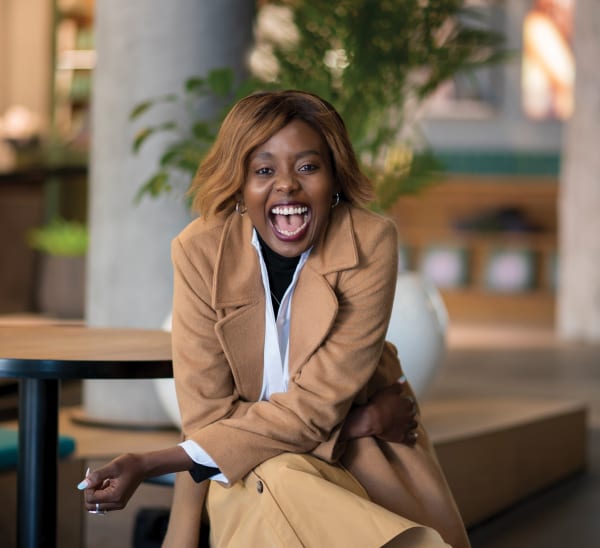The black and white of it all with Dr Kathomi Gatwiri

Words by Natalie O'Driscoll
Photos by Simone Gorman-Clark
Ever heard of a racial trauma psychotherapist? Until I sat down with Dr Kathomi Gatwiri, neither had I. And yet, in a country that likes to pride itself on its multiculturalism while simultaneously playing host to a fairly robust and vocal population of racists, we should probably have one working in every suburb of Australia.
One of the youngest Kenyan women to ever get a PhD (“To the best of my knowledge”, she disclaims), Dr Kathomi Gatwiri spent a lot of her earliest research years looking into vaginal fistulas in African girls and women.
For the uninitiated, a vaginal fistula is an opening that develops as a result of tissue death, causing a “hole” between the vagina and another organ, such as the bladder, colon or rectum. This can allow urine, gas or stool to pass through the vagina.
The most common causes of fistulas is prolonged labour, making it a more common issue among women who live in countries with limited medical resources. Women there can spend days in childbirth, and pressure from the baby pushing against the vaginal wall can cut off blood supply, leading to a fistula. As many as two million women in Asia and Africa live with untreated vaginal fistulas.
>>> Shop all things Nevertheless
Kathomi’s book, ‘African Womanhood and Incontinent Bodies’, explores the issue of women living with vaginal fistulas in Kenya, the country where she was born, and the research she did during her tenure at Flinders University in Adelaide has contributed to the good work done by the Fistula Project in Kenya.
“For my PhD research I wanted to understand how prolonged childbirth trauma that leads to obstetric fistulas impacts women’s lives,” she explains.
“A fistula often leaves women with a body that is uncontrollably incontinent so I was interested in seeing how women showed agency, how they coped and how they interpreted what had happened to their bodies.
“My dream is that women in Kenya – and everywhere – can give birth safely and receive treatment for conditions like fistulas without humiliation, fear or shame,” she says.
In addition to her early work in this area, Kathomi campaigned against female genital mutilation, early marriages and gendered violence. She is also the founder of Counting Dead Women – Kenya, an initiative that aims to record every woman’s murder reported in the Kenyan media.
Although a woman with pretty serious academic credentials in quite a difficult area, Kathomi is always on the edge of laughter. She has a cheeky sense of humour, a sing-song voice and a nose that crinkles delightfully when she find something hilarious, which is often. Chatting to her is a wholly delightful experience, despite the dark topics. It’s hard to imagine her being depressed or down, but she’s certainly been through those times too.
“I was actually so traumatised by my PhD research, because of interviewing all these women and seeing what had happened to their bodies, just the pain that lingers on for having an incontinent body for a decade or two decades and having no access to dignified care,” says Kathomi.
“I didn’t know it at the time I was just collecting stories, but after I finished my PhD and had finished writing my first book on it I just didn’t want anybody talking to me about fistulas, that was the first time I realised I was vicariously traumatised by this research I was doing.”
These days, Kathomi resides in Ipswich and works as a racial trauma psychotherapist. So what exactly is a racial trauma psychotherapist?
“My trajectory now is looking at racial trauma and how it impacts people and particularly children who are in care,” she explains.
“So just bringing that feminist lens into my trauma work and seeing how that could actually support children or black people who’ve experienced significant racial trauma. That’s how my research has evolved over the last few years.
“I feel like it’s always very predictable when you’re a black person that people will assume that what your interest will be will be to research race and blackness and racism and that wasn’t my interest at all.
“But the more I interviewed people and particularly black people, the more they just kept talking about these things like racial fatigue and racial trauma so I decided to make it the focus of my research because it was what was coming through the data.”

It was a strange set of circumstances that brought Kathomi to Australia. Her boss had flown to Melbourne for a conference, and visited a local church. The women in the church had asked her what she was doing there, and she explained all about the work being done around mental health for women living with fistulas.
One of the church ladies asked if there were any young Kenyan women she knew who would be interested in coming over to start or finish an undergraduate degree, financially supported by her. The boss recommended 21-year-old Kathomi.
“I was so nervous about it,” Kathomi recalls. “I thought it was too easy, it had to be human trafficking! I didn’t apply for anything, it just kind of fell in my lap.
“I remember when the plane landed in Tullamarine in Melbourne I didn’t get off the plane. I was like ‘I’ve made a bad decision’. And I asked the air hostess ‘Is this plane going back to Nairobi?’ and she was like ‘Oh honey that’s not how it works’.
“And I was just there crying... I want to go back to my mum, I don't know anyone... and she was very helpful and she walked me out of the aircraft and talked to me. And that was the start of the journey, over ten years ago.”
I asked Kathomi how long it took her to feel safe, and she laughs.
“I still don’t! That’s why I moved to Ipswich, to find my people.
“I mean safety is very layered isn’t it. I feel like when I was a very broke student, my body carried that fear, that vulnerability, and I feel like people could feel that energy.
“I received a lot of racial abuse, and I think it’s because people could sense that energy. And that amplified my fear, so after the first year I felt like I was done, I was going back, I’d finished my degree and I was lonely, depressed, and couldn’t get warm in Melbourne. I wanted my family.”
Kathomi’s sponsor, who wishes to remain anonymous, talked her into staying.
“She said she didn’t think I was ready to go home yet. She offered to pay for my doctorate because she thought I was very smart. She was very nurturing and very motherly and really looked after me.
“I didn’t know I had a PhD in me. I didn’t know I had a book in me. Someone has to open the door and see you in ways you don’t see yourself, and then you go ‘yeah I guess it’s not that hard, I think I can do this.’
“So basically she paid for my PhD which is nearly a hundred thousand dollars – incredibly generous. It was never on my radar to come to Australia, but I feel so lucky to have gotten these opportunities. It’s incredible for someone to believe in you that way.”
Kathomi now gives back by anonymously supporting other African girls through their education, something she believes very strongly in.
“My grandfather was a retired schoolteacher so he really from the get-go was very particular about education. Now the quality of education is a completely different story. Just because there’s a school there doesn’t mean you have access to any books or anything like that.
“I learned how to spell and to write in the dirt on the ground in the sand. We sat outside under a tree... That was school. There were no roofs on the classes. So one of my passion projects is when I have time to go and start repairing my primary school.”
I ask Kathomi about culture shock, and what really stood out to her culturally when she moved to Australia.
“When I came here my first shock was obsession with bodies. I was quite depressed in the first year, homesick, didn’t like the food, and I lost so much weight, I stopped menstruating because I was depressed and had no appetite and people were like ‘wow you look amazing’ and I was like ‘no I’m just sick and depressed’,” she shakes her head.
“And it was this fascination with food and bodies... having been brought up in a culture where big is beautiful and curvy is gorgeous and there is not this particular fascination with being skinny, that was the biggest culture shock.
“Everyone used to talk about food all the time, what it has in it, fat... sugar... I would think what does it matter? Just eat it, it’s food and you have it.”

The other tough element was the whiteness of Australia, and especially the Gold Coast, where Kathomi moved after completing her PhD in Adelaide.
“The other culture shock was becoming conscious of being black. It’s like I never realised I was black before I came here,” she says, laughing. “You know what I mean? We don’t walk down the street going ‘oh we’re black queens, black girl magic’,” here she falls about in giggles. “Everybody’s black at home!
“I remember going to ALDI one day and I saw this black woman there and I was so excited I gave her this big smile and a wave, and she just looked at me like – what the hell are you doing?” Kathomi chuckles at the memory.
There’s a great deal of narrative around Africans and African women in particular that gets fed to the western world, and a lot of it is pure bunkum, says Kathomi.
“People think African women are so oppressed by the patriarchy but I know many incredible women with lots of agency. It’s not like it was before. Yes my grandmother she was a broken and beaten woman, and she stayed with my grandfather because she felt like she had no choice.
“But here I am, with a doctorate and don’t really want marriage or children, and even my mother, who I thought would have a problem with it, is like ‘go live your best life’. Things have changed for women over the years all over the world, including Africa.
“When I saw those adverts about helping dying starving Africans on the television, I was thinking ‘we don’t look like that!’ I remember this strange feeling of hearing myself be talked about.
“And there’s always a child, and a fly. Why is there always a fly? It doesn’t matter how poor you are, you can swat a fly off your face!” We collapse into hysterics for a good minute.
When we’ve recovered, Kathomi continues.
“Seeing how we were projected in media made me think ‘no wonder people think we know nothing!’ That’s why I think these alternative stories are so powerful as well.”
Kathomi, still a full time academic at Southern Cross University, now spends as much time as she can working with people of colour in the community, helping them with their racial trauma. I’m curious about how one goes about treating a trauma that is likely to be ongoing for the rest of someone’s life.
“I teach mostly racial dignity,” she explains. “I’ve just published a theory about racial dignity which is the concept that you’re deserving of being afforded respect and humanity in life.
“So I don’t teach people how to cope with racism, I teach people to remember themselves. Because what white supremacy does, is it has to kill something in you to start implanting ideas about who it wants you to think you are.
“So I teach this African concept ‘sankofa’ which is basically returning to yourself, so if you travel back to the core of who you are, there’s a very beautiful person, a very whole person there.
“I also support parents, and a lot of women, to parent in a conscious way and a trauma-informed way to help their kids grow with some sense of racial dignity. I’m very proud of the work I do.
“Now I’ve got a waiting list as long as a year to come and see me, so I’m trying to see how I can expand this to incorporate racial training into psychology training, because it’s not even in the curriculum.”
And as for future Kathomi? “Oh, I’ll be rich and famous,” she sighs and smiles at me.
“I really don’t know,” she says seriously. “I live a very present life. No one is granted a future, and that allows me to not stay stuck. If it feels good and it aligns to my values then I’ll follow it.”


